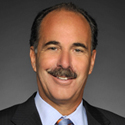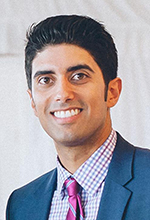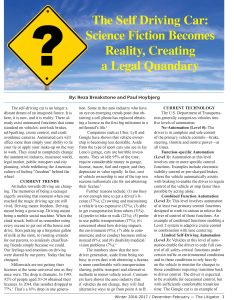Posts Tagged ‘self-driving cars’
Attorney Reza Breakstone: “The Self Driving Car: Science Fiction Becomes Reality, Creating a Legal Quandary”

Attorney Reza Breakstone of Breakstone, White & Gluck in Boston.
A self-driving Uber vehicle has been involved in a fatal pedestrian crash in Arizona. Attorney Reza Breakstone’s article explores liability when self-driving cars crash: https://tinyurl.com/y8qrfs69.
Can the City of Boston Be Held Liable for Self-Driving Accidents? Attorney Marc Breakstone Interviewed as Legal Expert for Boston Herald Article
 Attorney Marc L. Breakstone was quoted as a legal expert in a Boston Herald article titled “In Driver’s Seat With Insurance” (March 31, 2017). NuTonomy, the self-driving car company now testing its hands-free technology in Boston, has taken out a $5 million insurance policy to guard against lawsuits. Earlier this month, a self-driving Uber vehicle was involved in a car accident in Tempe, Arizona. Police found the Uber vehicle was traveling at 38 mph, below the speed limit, when the collision occurred and was not at fault. While there were no serious injuries, the accident has raised concerns.
Attorney Marc L. Breakstone was quoted as a legal expert in a Boston Herald article titled “In Driver’s Seat With Insurance” (March 31, 2017). NuTonomy, the self-driving car company now testing its hands-free technology in Boston, has taken out a $5 million insurance policy to guard against lawsuits. Earlier this month, a self-driving Uber vehicle was involved in a car accident in Tempe, Arizona. Police found the Uber vehicle was traveling at 38 mph, below the speed limit, when the collision occurred and was not at fault. While there were no serious injuries, the accident has raised concerns.
Attorney Breakstone was asked whether the City of Boston could be held liable if there is an accident involving NuTonomy. He said no, but read his full answer.
Attorney Reza Breakstone has written on the topic of self-driving cars and the legal questions they raise. In 2016, he co-wrote an article titled, “The Self Driving Car: Science Fiction Becomes Reality, Creating a Legal Quandary,” for The Litigator, the official publication of the Capital City Trial Lawyers Association in Sacramento, California.
Attorney Reza Breakstone Co-Authors Article on Legal Ramifications of Self-Driving Cars in California Lawyers Publication
 Attorney Reza Breakstone writes about the legal ramifications of self-driving cars in an article published in the Winter 2016-2017 edition of The Litigator, the official publication of the Capital City Trial Lawyers Association in Sacramento, California. Attorney Breakstone co-authored the article with Attorney Paul Hoybjerg of Roseville, California. In the article, “The Self Driving Car: Science Fiction Becomes Reality, Creating a Legal Quandary,” the authors write the time has come for the self-driving car.
Attorney Reza Breakstone writes about the legal ramifications of self-driving cars in an article published in the Winter 2016-2017 edition of The Litigator, the official publication of the Capital City Trial Lawyers Association in Sacramento, California. Attorney Breakstone co-authored the article with Attorney Paul Hoybjerg of Roseville, California. In the article, “The Self Driving Car: Science Fiction Becomes Reality, Creating a Legal Quandary,” the authors write the time has come for the self-driving car.
“The self-driving car is no longer a distant dream of an imagined future. It is here, it is now, and it is reality. There already exist automated functions that come standard on vehicles: anti-lock brakes, self-parking, cruise control, and crash avoidance cameras. Automated cars will affect more than simply your ability to tie your tie or apply your make-up on the way to work. They stand to completely change the automotive industry, insurance world, legal market, public transport and city planning, while redefining the American culture of feeling “freedom” behind the wheel.”
The article explains the current levels of automation among vehicles on the market, investments in the industry and ramifications for auto insurers and plaintiffs and defendants in personal injury cases.
“The less thrilling ramifications may be to the bottom line of auto insurers and the plaintiffs’ and defense bars in personal injury cases. Currently, auto insurance premiums account for $200 billion nationwide. The insurance industry, with decreased vehicle ownership and decreased liability issues on the part of the user, will find itself cut out of the equation. Allstate Corp. Chairman Thomas Wilson predicts that driverless cars will have “the most detrimental impact on auto insurance” and one “we don’t want to wait” to figure it out.”
About Attorney Reza Breakstone
Attorney Reza Breakstone joined Breakstone, White & Gluck as an associate in 2015. Learn more about Reza on our website.
Attorney Reza Breakstone: As Long as Humans are Part of the Equation, Tort Law Will Apply to Self-Driving Car Claims
We are reprinting a Letter to the Editor which ran in today’s Massachusetts Lawyers Weekly. The letter was written by Attorney Reza Breakstone of Breakstone, White & Gluck in Boston and J. Paul Hoybjerg of Sacramento, California.
 To the editor:
To the editor:
The Oct. 3 page 1 story “PI bar eyes ‘driverless’ technology carefully” raises important questions regarding the future of auto injury claims and the potential impact on tort lawyers.
One of the central questions is: Should all auto injury claims involving a self-driving car be treated as product liability claims? Our contention is no; tort law will be perfectly suited to address claims involving self-driving cars.
Although self-driving cars seem like an imminent reality, they are, in fact, still many years away from hitting the roads en masse. The technology will be phased in like other automatic features on cars. Responsibility for control of vehicles will diminish gradually.
Even after cars become more autonomous, humans will remain involved in many aspects of the operation of the vehicles. For example, there will be times when a person must take over the car or bring it to a stop. One must also keep the car in good condition, not permit operation in adverse weather conditions, and maintain the vehicle according to manufacturer recommendations (i.e., it may be negligent to make after-market changes such as lowering a vehicle or installing a new exhaust or programming chip to increase the speed).
Although product liability claims may be appropriate in certain instances, we are confident that the common law of negligence claims will evolve with the technology. A wholesale transformation of the practice is unnecessary. It is wise to look to trends to predict disruptions in the practice. But the self-driving car need not be that disruptive.
As long as humans are involved in the operation, maintenance, modification or repair of autonomous vehicles, tort jurisprudence will apply.
Reza Breakstone
Boston
J. Paul Hoybjerg
Sacramento, California
Read the Letter to the Editor here or it is available on Massachusetts Lawyers Weekly with subscription access.



